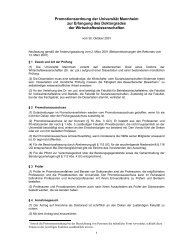The returns to cognitive and non-cognitive abilities in Germany
The returns to cognitive and non-cognitive abilities in Germany
The returns to cognitive and non-cognitive abilities in Germany
Create successful ePaper yourself
Turn your PDF publications into a flip-book with our unique Google optimized e-Paper software.
As for the exist<strong>in</strong>g evidence on the relation between <strong>cognitive</strong> <strong>and</strong> <strong>non</strong>-<strong>cognitive</strong><br />
<strong>abilities</strong> we restrict ourselves <strong>to</strong> a short <strong>and</strong> selective review of more recent research. First,<br />
f<strong>in</strong>d<strong>in</strong>gs for the relation between <strong>cognitive</strong> skills <strong>and</strong> labor market outcomes are - as<br />
mentioned above - somewhat ambiguous:<br />
On the one h<strong>and</strong>, there is a large number of studies that reveal substantial <strong>returns</strong> <strong>to</strong><br />
<strong>cognitive</strong> <strong>abilities</strong> <strong>in</strong> the US <strong>and</strong> Great Brita<strong>in</strong>. For example, Cameron <strong>and</strong> Heckman (1993),<br />
Blackburn <strong>and</strong> Neumark (1993), <strong>and</strong> more recently, Green <strong>and</strong> Riddell (2003) as well as<br />
Bronars <strong>and</strong> Oett<strong>in</strong>ger (2006) provide evidence for a positive relationship between <strong>cognitive</strong><br />
skills <strong>and</strong> earn<strong>in</strong>gs. On the other h<strong>and</strong>, there are as many studies suggest<strong>in</strong>g that <strong>cognitive</strong><br />
ability has barely any effect on earn<strong>in</strong>gs (Bound et al., 1986, or Murnane et al., 1995).<br />
Cawley et al. (2001), <strong>and</strong> Zax <strong>and</strong> Rees (2002) conclude that <strong>cognitive</strong> ability is a poor<br />
predic<strong>to</strong>r of earn<strong>in</strong>gs compared <strong>to</strong> a direct measure of education, family background, <strong>and</strong><br />
environment.<br />
Us<strong>in</strong>g scores from two ultra-short tests of <strong>cognitive</strong> ability that are <strong>in</strong>cluded <strong>in</strong> the<br />
German Socio-Economic Panel Study (SOEP), the results of Anger <strong>and</strong> He<strong>in</strong>eck (2008)<br />
suggest that speed of cognition is positively related <strong>to</strong> wages of West German workers even<br />
when educational atta<strong>in</strong>ment is controlled for. Verbal fluency on the other h<strong>and</strong> is not related<br />
<strong>to</strong> earn<strong>in</strong>gs. <strong>The</strong>y furthermore f<strong>in</strong>d that ability <strong>and</strong> education are <strong>in</strong>separable determ<strong>in</strong>ants of<br />
earn<strong>in</strong>gs which is <strong>in</strong> l<strong>in</strong>e with previous studies for other countries (e.g. Cawley et al. 2001).<br />
As for <strong>in</strong>dividuals’ personality, there is evidence that some personality traits are<br />
rewarded on the labor market while others are punished. Based on Russian data, Semyk<strong>in</strong>a<br />
<strong>and</strong> L<strong>in</strong>z (2007) f<strong>in</strong>d a positive association between an <strong>in</strong>ternal LOC <strong>and</strong> females’ earn<strong>in</strong>gs.<br />
He<strong>in</strong>eck (2007) exam<strong>in</strong>es data from the BHPS for the UK <strong>and</strong> f<strong>in</strong>ds a negative relation<br />
between wages <strong>and</strong> agreeableness whereas openness <strong>to</strong> experience is rewarded. Furthermore,<br />
there is a <strong>non</strong>l<strong>in</strong>ear gradient for wages <strong>and</strong> <strong>in</strong>dividuals’ conscientiousness. Other studies that<br />
8















